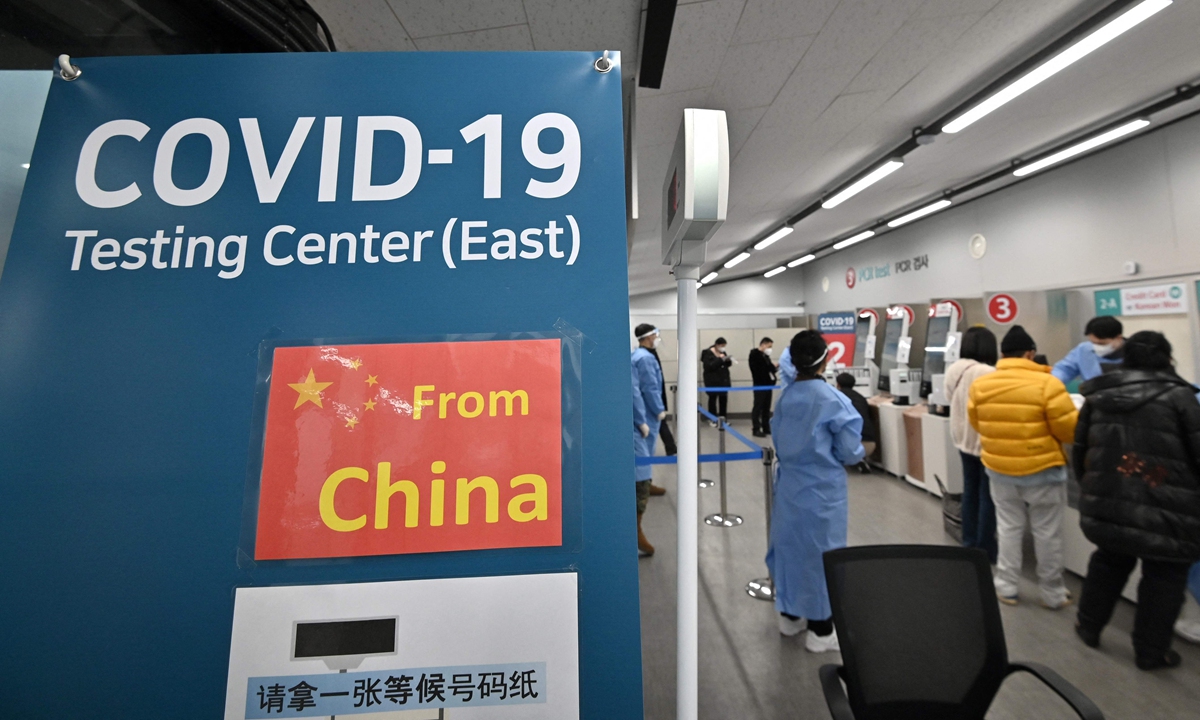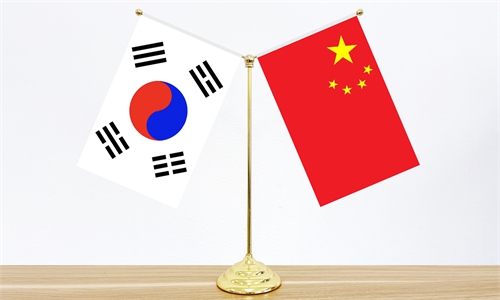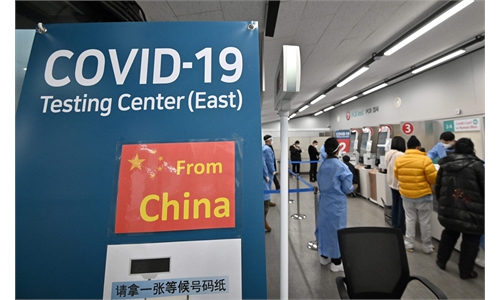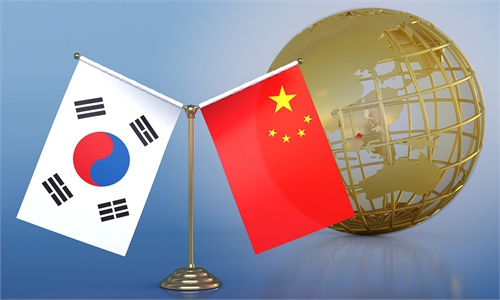South Korea should give a rational explanation for Chinese travelers’ revelation: Global Times editorial

Health workers guide travelers from China at a COVID-19 testing center at Incheon International Airport in South Korea on January 3. Photo: VCG
The Chinese Embassy in South Korea said in a statement released on Tuesday that China has suspended the issuing of short-term visas for South Korean citizens. The above decision will be reassessed once South Korea removes its discriminatory travel restrictions targeting travelers from China. It is China's first countermeasure after a few countries adopted discriminatory entry restrictions against China. This is a necessary, rational and appropriate response from China in accordance with the principle of reciprocity.Currently, South Korea is one of the countries that have taken the strictest discriminatory entry restrictions against China. On January 2, the South Korean government halted short-term visas for people traveling from China, and temporarily stopped the plan of increasing flights from China. And at the same time, flights from the Chinese mainland to South Korea will only be able to enter through Incheon International Airport.
Then, South Korea's restrictions on Chinese travelers have been ramped up all the way. Even some South Korean media outlets, such as the Dong-a Ilbo, have admitted that the South Korean government's anti-epidemic measures against China are more intensified in comparison with other countries like Japan and the US. Seoul should not be surprised by China's countermeasures.
In recent days, Chinese netizens have repeatedly exposed that South Korea's anti-epidemic measures against Chinese travelers are "insulting" and that "checks are only targeting Chinese people." In addition to the fact that passengers who were refused entry were taken to "a small dark room" for detention, the conditions of the self-paid quarantine sites were very poor, even without beds and hot water. The most striking matter was the "yellow card" issue. Many netizens said that when they got off the plane, they were issued a yellow card and had to hang it around their necks, and were taken to designated areas "like criminals."
Relevant revelations have triggered strong dissatisfaction on the internet in China. We believe that South Korea should give a rational explanation for the relevant revelations: Is the above situation true? If it is, are the relevant measures only aimed at Chinese travelers? Does South Korea have any measures to protect the legitimate rights and interests of Chinese nationals when they enter the country?
After China announced countermeasures on Tuesday, South Korea said that its entry restriction measures against China are "based on scientific and objective grounds." However, according to South Korean media, from January 2 to 9, 17.5 percent of passengers arriving in South Korea from China tested positive on arrival, and the figure for Tuesday stands at 5.5 percent.
Obviously, there is no scientific evidence to prove whether this ratio poses a threat to public health in South Korea and whether the corresponding measures in South Korea are appropriate. The decision is based on "feelings." Why doesn't South Korea test travelers from other countries at the peak of the epidemic, such as the US and Japan, on arrival and announce their positive rate? As we all know, the US and Japan are experiencing a new round of infection peaks, and there are many reports in South Korean media that the XBB variant which is spreading wildly in the US is about to "occupy Europe." South Korea makes a big fuss about its entry restriction policy and implementation, which inevitably makes people doubt whether it is a political show.
After China optimized and adjusted its epidemic prevention and control measures, many countries expressed their welcome. If there are doubts in South Korea, related issues can be resolved through sincere and pragmatic communication. In fact, China has fully communicated with relevant countries with the utmost sincerity and a pragmatic attitude, and introduced in detail the scientificity and rationality of China's optimization and adjustment of epidemic prevention measures and the current domestic epidemic situation in China.
However, the measures taken by South Korea are regrettable. Actually these measures first hurt South Korea itself, because Chinese tourists were the largest source of income for the South Korean tourism industry before COVID-19 outbreak, and 70 percent of the retail sales of South Korean department stores were from Chinese tourists. The practice of South Korean government is also unpopular at home with complaints and questions.
South Korean public opinion is talking about China's previous immigration management measures, but it should be pointed out that although China's previous epidemic prevention policies were strict, it has never implemented discriminatory policies against any country, but treats them equally based on a scientific and realistic attitude.
The countermeasures that China is currently implementing are not aimed at South Korea, but the policy that discriminates against Chinese tourists. In the past two days, Thailand and other Southeast Asian countries have embraced Chinese tourists with open arms, and the bustling scene of the airports in these countries has swamped the screens. This should somewhat touch the South Korean side.
China and South Korea are close neighbors and inseparable partners. Even during the most severe period of the epidemic, China and South Korea took the lead in finding the facilitating means and innovative mechanism arrangement against the backdrop of epidemic prevention and control. The economic and trade cooperation between the two countries broke through the interference of the virus, benefited both countries, and ensured the stability of South Korea's industrial chain. This is a truly "scientific and objective" attitude to respond to the epidemic, and South Korea should not lose it.



